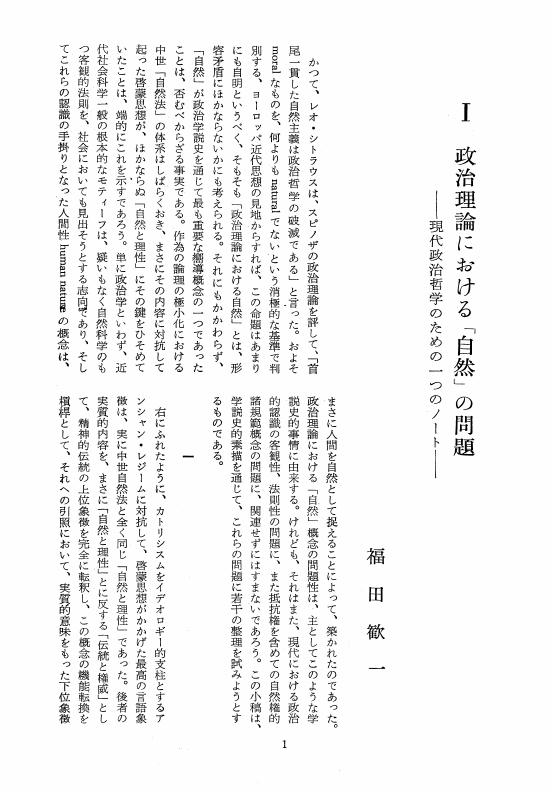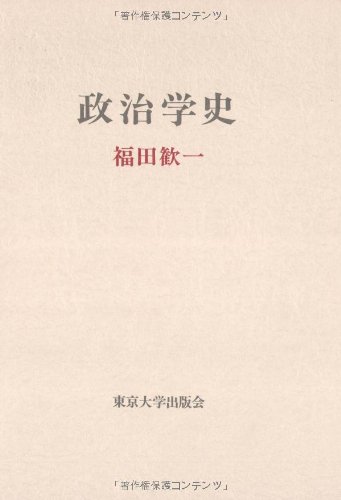2 0 0 0 OA 思想史の中の国家 (平成八年六月一一日提出)
- 著者
- 福田 歓一
- 出版者
- 日本学士院
- 雑誌
- 日本學士院紀要 (ISSN:03880036)
- 巻号頁・発行日
- vol.51, no.2, pp.151-167, 1997 (Released:2007-06-22)
- 参考文献数
- 23
Since the 19th century the state has been used diachronically as the term signifying the political society. But until the end of the 18th century the term civitas also had been used at least in the academic world. Originally civitas was the word meaning Roman city-state, interchangeable with populus or res publica, and was taken synonym of Greek polis. These city-states were communities of their citizens above all. But koinonia politike and societas civilis were provided with their governmental systems at the same time.On the other hand the new term stato which came to be used in the 15th century Italy originally meant the political power, the power holder or his governing instrument. Jean Bodin tried to make the state include also all the governed, and at the same time, he discriminated the city from the state which came to have sovereignty. Bodin's theory therefore contributed so much to establish the modern absolutist state, which included all estates and various corporations under the sovereign power, but was after all the patrimony of some dynasty.The social contract theory which took many conceptual weapons from the classical terminology constructed the new image of the political society upon the model of the voluntary association. Being provided with the new notion of the nation, French Revolution established the nation state which excluded all corps intermédiaires, and left the model“one nation, one language, one state”. It is well known that the people called each other with the title citoyen.But even in France the term of civil began to cease to be interchangeable with politique as the code civil exemplified. In Britain The Wealth of Nations presented a system of material reproduction of the society, independent of the governmental power. On the other hand individed Germany the state had been the objective to be achieved. After his vigorous study of British political economy, Hegel presented his system of Sittlichkeit composed of family, civil society and the state. His bürgerliche Gesellschaft could not be self-contained and should be completed by the state. Now Bürger meant only bourgeois, not citoyen, and the new term Staatsbürger came to be inevitable.In the beginning of the 20th century, only half of the global population had their citizenships of some state. Owing to the principle of national self-determination, many new states emerged in Europe after the 1st World War. And the de-colonization after the 2nd World War and the dissolution of Soviet Union brought new states to many men and women. Nearly all global population would have their citizenships in the end of this century. But this universalization of the state would be its nominalization at the same time, not only in the developping countries, but also in the developped ones. The pursuit of their identities of various groups and the borderless condition of the survival of mankind urged us reconsider the self-evidence of the nation state. We had better, I believe, cease applying the concept of the state diachronically and to put it in a historical perspective of ideas.
2 0 0 0 OA 政治理論における「自然」の問題-現代政治哲学のための一つのノート-
- 著者
- 福田 歓一
- 出版者
- 日本政治学会
- 雑誌
- 年報政治学 (ISSN:05494192)
- 巻号頁・発行日
- vol.13, pp.1-18, 1962-05-14 (Released:2009-12-21)
1 0 0 0 OA 政治認識の用語について
- 著者
- 福田 歓一
- 出版者
- The Japan Academy
- 雑誌
- 日本學士院紀要 (ISSN:03880036)
- 巻号頁・発行日
- vol.48, no.3, pp.171-187, 1994 (Released:2007-06-22)
- 参考文献数
- 27
In any political discourse some diachronic terms are indispensable, but these terms themselves were originally made in some age in the contexts of real situations. Therefore we are obliged to use these terms with enough consciousness of their original contexts.Moreover the scholars in Non-Western world have another problem concerning translation of terminology. Both European and native term has many meanings, and one term scarcely corresponds to its counterpart.Japanese term minzoku covers ethnos, populus, natio and so on, which on the other hand cover far more meanings than minzoku, and also have special contexts in their usages.Although the term“nation”derives from Middle Ages, its modern usage presupposed the emergence of sovereign state as a governing mechanism and provided it of some sense of community. The emergence of modern languages and the communication through printed matters made it possible and through French Revolution the new model of political integration“one nation, one language, one state”was established, while against Napoleon's imperialism nationalism rose in Germany and so on. Around the 1st world war“nation self determination”came to be a principle after the collapse of empires, Austrian, Russian and Turkish. And after the 2nd, this principle lead to the independence of colonies in Asia and Africa. In 1960s new term of ethnicity, the status of ethnic groups within the framework of nation state, was made originally in the mufti-racial United States of America. And this term came to be applied to the ethnic movements in Western Europe, the very birth place of nation states, and also extended to the developing countries, which covered former colonial territories and naturally consisted of many ethnic groups. The end of Soviet domination of Eastern Europe brought the third wave of“national self determination”, which also disintegrated the Soviet Union itself as well as Yugoslavia. Now we are watching many tragedies in e.g. Gorgia and Bosnia. But “national self-determination”no more could be the solution of many problems in this age of multi-identity of the individual, and the relativization of state system would be indispensable for the prospect of mankind.
1 0 0 0 現代政治と民主主義の原理
1 0 0 0 政治における暴力と恐怖の問題--テロリズムの受け取り方について
- 著者
- 福田 歓一
- 出版者
- 岩波書店
- 雑誌
- 思想 (ISSN:03862755)
- 巻号頁・発行日
- no.452, 1962-02
1 0 0 0 OA 最近の civil society 論と政治学史の視点 (平成一〇年六月二三日 提出)
- 著者
- 福田 歓一
- 出版者
- 日本学士院
- 雑誌
- 日本學士院紀要 (ISSN:03880036)
- 巻号頁・発行日
- vol.53, no.2, pp.89-101, 1999 (Released:2007-06-22)
- 参考文献数
- 22
Since Polish Solidarity, which had struggled against the Communist state power on the basis of voluntary associations and independent communication among the governed, proved political success, the term“civil society”came to have a new usage quite different from Hegelian bürgerliche Gesellschaft i. e. bourgeois society. Jurgen Habermas used the new term Zivilgesellschaft in his preface to the 1990 edition of his Strukturwandel der Öffentlichkeit. And since the East European Revolution dissolved Soviet rule, this new usage has been welcome by the suffering peoples from dictatorial powers of e. g. Latin America. It was also in Western Europe as well as North America. Now many scholars there are busy to theorizing this new usage. In the United States, the very matrix of voluntary associations, Cohen and Arato proposed to define the civil society as the public space not only against the state system but also against the market system. I personally take this trend as an effort to break through the predicament of radical democratic theory at present, and want to reexamine of this new usage in the context of the conceptual history.Nobody denies that the social contract theory replaced the modern sovereign state, which had been the patrimony of some dynasty by the civil or political society composed of free and equal citizens on the model of the voluntary association. But the class structure of the industrial state led Hegel to define the civil society as the system of Bedürfnisse quite different from the political society, and gave Marx the vision of the classless society by the abolition of this bourgeois one. Radical democratic movement originally pursued to solve this class problem within multi-party system on the basis of universal suffrage. But simple state-citizens relationship which public law presupposed under the influence of the social contract theory was not enough to carry out this scheme. Therefore the utilization of corps intermédiaires has been raised from time to time. Tocqueville highly esteemed the voluntary associations under Jacksonian democracy in America. The pluralistic theory of the state challenged the sovereignty of the state and defended the rights of the Church, universities and trade unions. And now that the Welfare State realized only the client democracy in the mass society, and people came to be aware the reality of neocorporatism, the recent usage of the civil society naturally has a powerfull appeal to the radical democrats of the West.At the end of this century it is evident that the market economy has been more and more global, and at the same time serious problems which voluntary associations had tuckled e. g. of environment, information and population have turned also to be solved globally. There would be many difficulties on the way of radical democratic movements. Especially in Japan where so many corporations under bureacratic government has assumed the name of associations, the problems would be more serious than in the West. Now that the NPO Act was promulgated this year, 1998, I cannot help hoping the theorist's revisit the Christian sects which gave the model of the civil society on the basis of voluntary individuals.
1 0 0 0 国民国家以後
- 著者
- 福田 歓一
- 出版者
- 日本學士院
- 雑誌
- 日本學士院紀要 (ISSN:03880036)
- 巻号頁・発行日
- vol.58, no.3, pp.171-179, 2004-03

